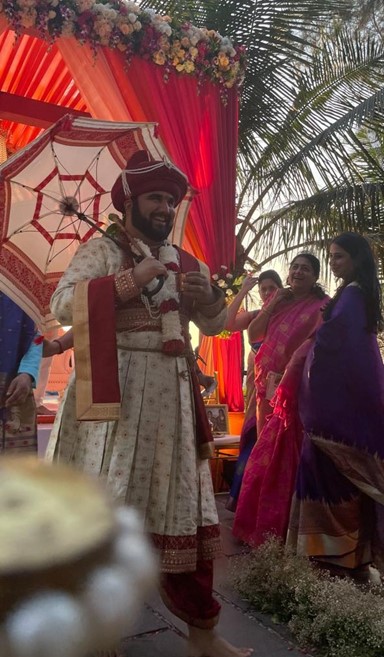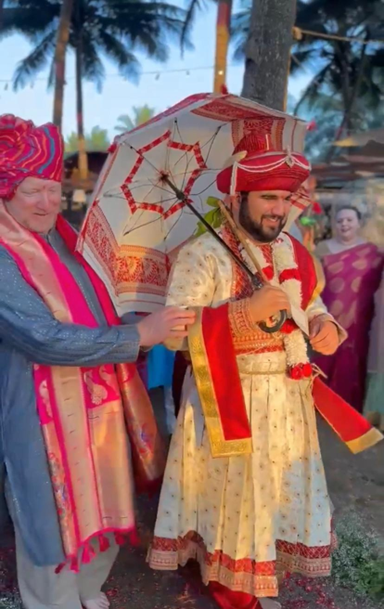
In March, Katie and I celebrated our long awaited Indian wedding. Surrounded by friends and family, in the picturesque setting of Goa on the west coast of India, we re-affirmed our marriage commitment to each other in a traditional Hindu ceremony. For those who are not familiar, a Hindu wedding is made up of a series of rituals, starting with individual rituals for the bride and groom and leading up to the “I do” moment where you make vows, walk around the fire, and actually get married. Today, I want to share with you one of the rituals I participated in on my wedding day. It is called Kashi Yatra, which literally translates to “Pilgrimage to Kashi.”
In this part of the ceremony, the groom pretends to leave for Kashi, a spiritual pilgrimage center, to devote himself to God, learn spirituality, and expand his knowledge. Basically, the groom intends to leave and become an ascetic or monk devoted entirely to achieving salvation or enlightenment. The bride’s father persuades him to come back and enlightens him about grihastha ashram (the path of salvation through taking up the second stage of life as a householder) and suggests that his daughter would make a great partner and soulmate.
I used to think that this ritual was a little silly. And it kind of is. In the middle of a wedding, we’re going to do this play acting? My father in law, Warren, kept joking that maybe he would let me leave! Also, like many other wedding elements from around the world, this ritual has some patriarchal overtones that are uncomfortable. Why does the bride’s father get to “give her away” to stop the groom from leaving anyway? But putting aside both the silly and serious baggage, I have grown to love this ritual. I find it powerful for two reasons:
- It enshrines doubt as a fundamental part of the wedding ceremony. In our culture, getting “cold feet” has a negative connotation, but it is perfectly natural to have some doubt on the eve of a big commitment, to think about the other ways in which your life could go, and make sure that this is really the right choice. This does not cheapen the commitment of marriage. On the contrary, it honors the commitment as something that ought to be chosen consciously and thoughtfully.
- It affirms that choosing to have a family and participate in the world is an equally valid spiritual path to monasticism or asceticism. Maintaining our individual relationship with and knowledge of God is important, yes, but it does not have to come at the cost of maintaining our relationships with our family, friends, and community. We don’t have to wall ourselves off from society and meditate to get closer to God. That can certainly help, but God is also found in community, in how relate to our loved ones and our neighbors.
I am happy to report that in the end, Warren did stop me and return me to the wedding, but I feel blessed and amused in equal measure by my “attempt” to leave.

